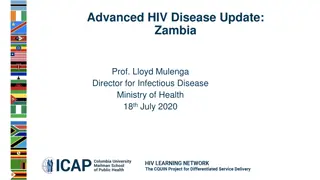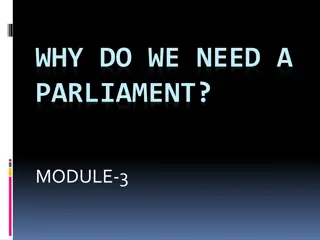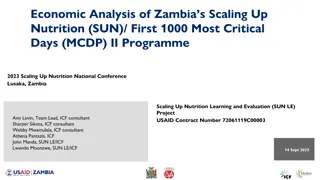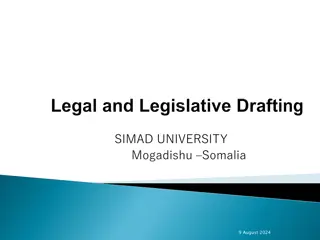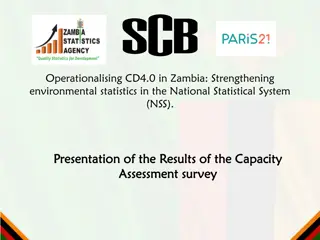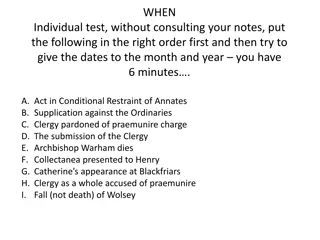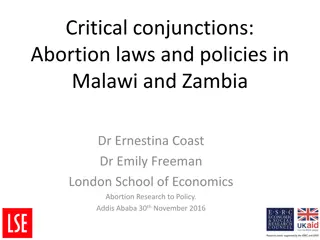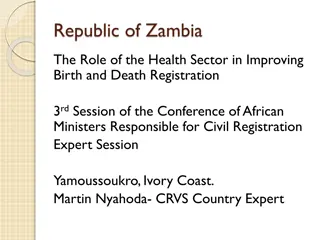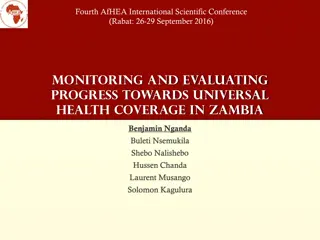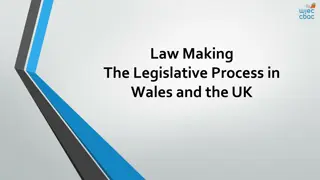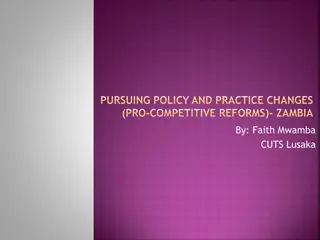Role and Function of Zambia's Parliament
Zambia's Parliament, consisting of the President and the National Assembly, plays a crucial role in the country's legislative process. The National Assembly is composed of directly elected members and nominations from the President, with specific rules regarding qualifications and functions. Parliament has the exclusive power to enact legislation, oversee government performance, and exercise the legislative authority on behalf of the people. The election of Members of Parliament (MPs) follows constitutional guidelines to ensure a fair and democratic representation of the Zambian population.
Download Presentation

Please find below an Image/Link to download the presentation.
The content on the website is provided AS IS for your information and personal use only. It may not be sold, licensed, or shared on other websites without obtaining consent from the author.If you encounter any issues during the download, it is possible that the publisher has removed the file from their server.
You are allowed to download the files provided on this website for personal or commercial use, subject to the condition that they are used lawfully. All files are the property of their respective owners.
The content on the website is provided AS IS for your information and personal use only. It may not be sold, licensed, or shared on other websites without obtaining consent from the author.
E N D
Presentation Transcript
UNIT 6- PARLIAMENT Mrs Kaswalale K Mwauluka
OUTLINE Composition of Parliament The Role / Function / Powers of Parliament Election of the Members of Parliament (MPs): The Electoral System for MPs Qualification Electoral Campaigns Election Petitions / Disputes Vacancy Relationship between Parliament and the President
COMPOSITION OF PARLIAMENT Article Article Parliament of Zambia which consists of the President and the National Assembly. A member of the National Assembly shall be referred to as a Member of Parliament (Article 62). 62 62. . ( (1 1) ) There is established the
COMPOSITION OF THE NATIONAL ASSEMBLY Article 68 provides for the composition of the national assembly. It consists of: 156 members directly elected on the basis of a simple majority vote under first-past-the-post system. Not more than 8 nominated members (Article 69- such a person is nominated by the President if he/she considers it necessary to enhance the interests, skills or gender in the National Assembly. A person who was a candidate for election in the last preceding general election or a subsequent by-election is not eligible to be nominated as a Member of Parliament). The Vice President The Speaker The First and Second Deputy Speakers representation of special
ROLE/FUNCTION/POWERS OF PARLIAMENT Article 62 (3)- A person or body, other than Parliament, shall not have power to enact legislation, except as conferred by this Constitution. parliament is therefore, the enactment of laws. Article Article 61 61. . The The legislative legislative authority derives derives from from the people of Zambia and shall be exercised in a manner that protects this Constitution and promotes the democratic governance of the Republic. (2) The legislative authority of the Republic is vested in and exercised by Parliament. The function of authority of of the the Republic Republic
CONTINUATION Parliament shall enact legislation through Bills passed by the National Assembly and assented to by the President- article article 63 National assembly overseeing the performance functions. 63 has the function of executive of
ELECTION OF THE MEMBERS OF PARLIAMENT (MPS) The election of the members of parliament commonly referred to as MPs is governed by the provisions of the Constitution. A member of parliament is a member of the national assembly- Article 62 (4) Article 62 (4) The parliament of Zambia consists of the President and the National Assembly.
ELECTIONS TO NATIONAL ASSEMBLY (AND MEMBERS OF PARLIAMENT) A member accordance Constitution (elections to the national assembly are conducted under electoral system in accordance with Article 68). of with parliament article is elected (2) in 47 of the first-past-the-post
QUALIFICATION AND DISQUALIFICATION OF MPS There is need to take into consideration matters pertaining to the qualification and disqualification of members of parliament. This is provided for in Act No 2 of 2016
QUALIFICATIONS Article 70 (1) provides for the qualifications of members of parliament. A person is eligible to be elected as a Member of Parliament if that person: Is a citizen Is a 21year old Is a registered voter Has obtained, as qualification, a grade twelve certificate or its equivalent a minimum academic
DISQUALIFICATIONS OF MEMBERS OF PARLIAMENT Article 70 (2) provides for the disqualifications of members of parliament. A person is disqualified from being elected as a member of parliament if that person: Is validly nominated as a candidate in a presidential election Is a public officer or constitutional office holder Is a judge or judicial officer Has a mental or physical disability that would make the person incapable of performing the legislative function Is an undischarged bankrupt Is serving a sentence of imprisonment for an offence under a written law
Has, in the immediate preceding five years, served a term of imprisonment of at least three years Has, in the immediate preceding five years, been removed form public office on ground of gross misconduct Holds or is acting in an office, as prescribed, in the functions of which involve or are connected with the conduct of elections.
FIRST-PAST-THE-POST SYSTEM A first-past-the-post is a voting method in which voters indicate on a ballot the candidate of their choice, and the candidate who receives most votes wins. First-past-the-post voting is one of several plurality voting methods. Plurality voting is an electoral system in which each voter is allowed to vote for only one candidate, and the candidate who polls the most among their counterparts is elected. It is a common, but not universal, feature of electoral systems. First-past-the-post voting is widely practiced in the world.
ELECTORAL SYSTEM FOR MPS The Constitution of Zambia provides for the electoral system for MPs.
PRINCIPLES OF ELECTORAL SYSTEMS AND PROCESS The electoral system demands that in the election for the president, member of parliament and councillors there should be an existence of: Citizens freedom to exercise political rights universal adult suffrage based on the equality of a vote fair representation of the various interest groups in society gender equity in the National Assembly or council Refer to article 45.
UNIVERSAL ADULT SUFFRAGE The concept of universal the right to vote with reference to the prescribed age limit in a particular society. As such, minors are generally excluded. Universal adult suffrage is the right of citizens in a given society who are entitled to vote in an election to select, at periodic intervals when these elections are called, a government to represent them. Usually, the only restriction applies to people people under under a a certain certain age age. . universal adult adult suffrage suffrage pertains to
ELECTORAL PROCESS AND ADMINISTERING OF ELECTIONS The electoral process and system of administering elections shall ensure (a) that elections are free and fair; (b) that elections are free from violence, intimidation and corruption; (c) independence, accountability, transparency of the electoral process; (d) a simple and practical system of voting and tabulating votes; and (e) timely resolution of electoral disputes Refer to article 45 efficiency and
WHO IS ENTITLED TO VOTE???? Persons registered as voters Attained the age of 18
ELECTORAL SYSTEM Article 47- Elections to the office of President shall be conducted majoritarian electoral winning candidate must receive more than fifty percent of the valid votes cast, and in accordance with Article 101 Elections to the National councils shall be conducted under a first-past- the-post electoral system directly, system, under where a the Assembly and
MAJORITARIAN ELECTORAL SYSTEM A majoritarian voting system is an electoral system which gives the right to appoint all the representatives to the majority of the electors, denying representation to all minorities.
ACCESS TO MEDIA Article Article 50 contesting contesting an media, especially during election campaigns. 50- - A A political political party an election election shall have access to the party and and a a candidate candidate
INDEPENDENT CANDIDATES Article 51 of Act No.2 of 2016. A person is eligible for election as an independent candidate for a National Assembly seat if the person (a) is not a member of a political party and has not been a member of a political party for at least two months immediately before the date of the election (b) meets the qualifications specified in Article 70 for election as a Member of Parliament.
NOMINATIONS Article Article 52 nomination paper to a returning officer, supported by an affidavit stating that the candidate is qualified for nomination as President, Member of Parliament or councillor, in the manner, on the day, and at the time and place set by the Electoral Commission by regulation ( (2 2) ) A returning officer shall, immediately on the filing of a nomination paper, in accordance with clause (1), duly reject the nomination paper if the candidate does not meet the qualifications or specified for election to that office. 52. . ( (1 1) ) A candidate shall file that candidate s procedural requirements
DISPUTE IN RELATION TO A NOMINATED CANDIDATE A person may challenge, before a court or tribunal, as prescribed, the nomination of a candidate within seven days of the close of nomination and the court shall hear the case within 21days of its lodgement- Article Where a candidate dies, resigns or becomes disqualified in accordance with Article 70, 100 or 153 or a court disqualifies a candidate for corruption or malpractice, after the close of nominations and before the election date, the Electoral Commission shall cancel the election and require the filing of fresh nominations by eligible candidates and elections shall be held within thirty days of the filing of the fresh nominations- Article Article 52 52 ( (4 4) ). Article 52 52 ( (6 6) ). .
UNOPPOSED CANDIDATE Where only one candidate is nominated for election as President, Member of Parliament or councillor, by the date and time set by the Electoral Commission for receiving nominations and at the close of the nomination period, that candidate shall be declared duly elected- article 53 (1) article 53 (1).
NOMINATIONS FOR ELECTION TO NATIONAL ASSEMBLY Article 71. A nomination for election to the Article 71. A nomination for election to the National Assembly is valid National Assembly is valid if the candidate (a) has paid a prescribed election fee to the Electoral Commission; and (b) is supported by at least fifteen persons registered as voters in the constituency in which the candidate is standing for election. .
ELECTION PETITION/DISPUTES Election petitions/disputes may arise and these are governed by the Constitution. provisions of the
PETITION OF ELECTION OF MEMBER OF PARLIAMENT Article 73 73 of of Act Act No No 2 2 of of 2016 A person may file an election petition with the High Court to challenge the election of a Member of Parliament. An election petition shall be heard within ninety days of the filing of the petition. A person may appeal against the decision of the High Court to the Constitutional Court. A Member of Parliament whose election is petitioned shall hold the seat in the National Assembly pending the election petition. Article 2016 determination of the
PRESIDENTIAL ELECTIONS AND PETITION Article Article 47 under a majoritarian electoral system were the winning candidate must receive more than fifty percent of the valid votes cast in accordance with Article 101. Article Article 101 101 ( (1 1) )- - states that a president is elected by registered voters. 47- Presidential elections are conducted
ARTICLE 101 Article 101 (3) Article 101 (3) If at the initial ballot a presidential candidate does not receive more than fifty percent of the valid votes cast, a second ballot shall be held within thirty-seven days of the initial ballot, where the only candidates shall be the presidential candidates who obtained (a) the highest and second highest number of valid votes cast in the initial ballot (b) an equal number of the valid votes cast in the initial ballot, being the highest votes amongst the presidential candidates that stood for election to the office of President.
ELECTION PETITION- ARTICLE 103 A person may within seven days of the declaration made under clause (2), petition the Constitutional Court to nullify the election of a presidential candidate who took part in the initial ballot on the ground that (a) the person was not validly elected; or (b) a provision of this Constitution or other law relating to presidential elections was not complied with. The Constitutional Court shall hear an election petition filed in accordance with clause (4) within fourteen days of the filing of the petition. The Constitutional Court may, after hearing an election petition (a) declare the election of the presidential candidate valid; (b) nullify the election of the presidential candidate; or (c) disqualify the presidential candidate from being a candidate in the second ballot. A decision of the Constitutional Court made in accordance with clause (6) is final. The presidential candidate who obtains the majority of the valid votes cast in the second ballot shall be declared President-elect.
CASES Mazoka and 5 Others v AG, ECZ and Chief Justice






